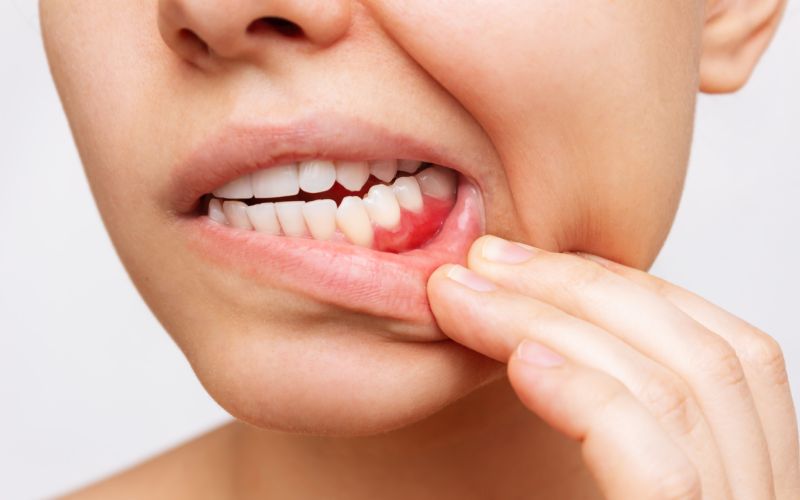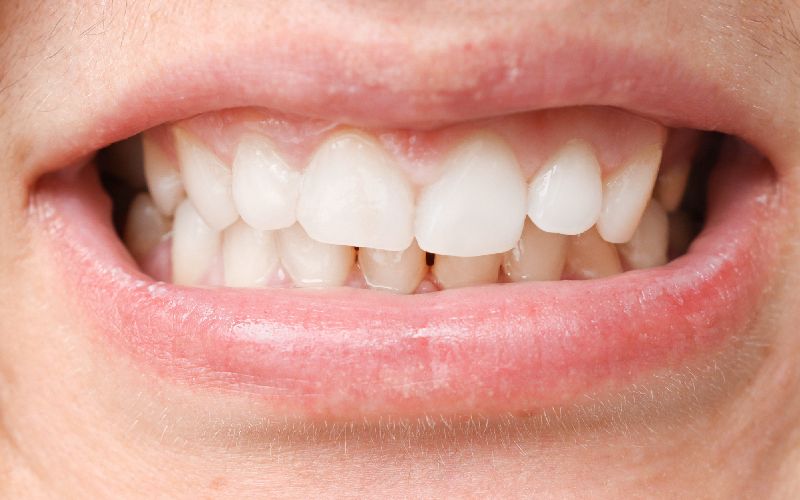If members of your family have a certain oral health condition, you may be more at risk of developing it, too, but it depends on the specific condition. There are genetic markers that are associated with a higher risk of certain issues, but sometimes, the higher numbers in a family with the condition may be due to poor dental hygiene habits that were learned.
Table of Contents
ToggleLink Between Genetics and Oral Health Problems
Hereditary factors may be linked to specific oral health conditions. Genetic tests for this are not available, however.
There are hereditary general health conditions and diseases which may impact oral health. This creates an indirect link between a dental condition and hereditary risks. People with diabetes are more likely to have dry mouth, and dry mouth is associated with a higher risk of tooth decay and gum disease because bacteria builds up more on gums and teeth without enough saliva. There is a higher chance of having diabetes if a family member has it, so a higher chance of dry mouth.
Oral Health Issues
Below are some oral and dental health concerns that may have hereditary risk factors.
Tooth Decay
Tooth decay is caused by dental plaque and bacteria, and good oral hygiene practices are the most critical factor in risks, but certain variations of genes have been linked with higher risks of tooth decay and cavities in permanent teeth. In addition, health conditions that cause dry mouth, including diabetes, can make you more prone to tooth decay.
It’s important to also note that a family may have higher numbers of cavities because of poor oral hygiene habits that were learned together. Even if this is not the case, and you may be genetically predisposed to tooth decay, there are precautions you can take to reduce any risks.
There are prescription mouthwashes and toothpastes that may help. You may also benefit from more frequent dental exams, so any dental problems are caught early, and more frequent professional dental cleanings to remove plaque. For those that have higher risks, fissure sealants and fluoride treatments may be applied.

Periodontal (Gum) Disease
Gum disease is caused by bacteria and plaque, but some people may have a genetic predisposition to gum disease. Gum disease starts with a mild swelling and inflammation of the gums, known as gingivitis, but if not treated, progresses to periodontal disease. Eventually, tooth loss and loss of bone mass may occur. If you have family members with gum disease, you are at higher risk of developing it yourself, so it’s recommended you take additional precautions.
Let your dentist know if gum disease runs in the family. Visiting your dentist regularly so that any changes in oral health, including gum disease, can be diagnosed and treated as early as possible minimizes any oral and dental problems.

Misaligned Teeth
Overcrowded and crooked teeth often have a genetic factor. Jawbone size is inherited, and this impacts how much space there is for teeth. A smaller jaw can lead to crowded teeth and crookedness. Jawbone size can cause issues in jaw joints, too. Hereditary factors can lead to a range of issues related to misalignment and crookedness, including overbites, underbites, gaps, and more.
Since some of these issues are also linked to higher risks of tooth decay and gum disease, as it is more difficult to keep crooked teeth cleaned properly, and poor bites can lead to temporomandibular joint (TMJ) disorder, treating these issues is important.
Early diagnosis and treatment through orthodontics, including braces or Invisalign can correct crooked or misaligned teeth to prevent other oral health problems.
Issues With Composite Fillings Falling Out
A study indicates that certain genetic factors may be involved in composite fillings failure for people with the inherited MMP-2 gene. This controls the production of an enzyme that can degrade the bonding of the tooth surface and the composite filling. People with this gene are more likely to have problems with composite fillings.
Discolouration
Genetics are one factor that influences tooth color. Certain people naturally have thinner tooth enamel which allows the yellowing dentin layer underneath to show through more. However, tooth enamel also thins as you age, and can be worn away or eroded through acidic foods and drinks, so avoiding acidic and overly-abrasive dental cleaners are recommended. Tooth enamel doesn’t grow back, so it’s important to protect it. Your dentist can recommend treatments, as well.
Oral Cancer
Genetics may play a minor role, but lifestyle choices, including alcohol and tobacco use are the top risk factors. People with certain genetic markers have a higher risk of getting oral cancer, but eliminating alcohol and tobacco, and eating a healthy diet plays a larger role.

Impact of Learned Habits and Lifestyle Choices on Keeping Your Mouth Healthy
Genetics can play a minor role in certain conditions, and a more significant one in others, but environment and lifestyle choices play an important role in nearly all oral health issues, from preventing to mitigating them.
For example, at younger ages while teeth are developing, nutrition plays a key role. Not getting enough calcium at this stage can lead to weaker teeth and a greater risk of cavities. Since diet tends to impact the entire family, and eating habits are learned, this means many family members may have the same issues, but the cause is nutrition and habits, not hereditary, or genetic makeup causes.
Even if you are genetically predisposed to an issue, you can compensate with excellent oral hygiene, nutrition, and other preventive measures. Regular dental visits and cleanings will help, with preventive dentistry treatment, such as sealants and topical fluoride, and early treatment of issues that do emerge.
Gateshead Dental is conveniently located in Stoney Creek, and can help you with common oral health problems, and guide you on ways to reduce the risk factors under your control. Be sure to let us know about your family history, so we can help better.
He’s completed a number of additional courses to best serve his patients and be able to educate them too. No matter your age or dental condition Dr. Sims can assist you in a professional manner and loves answering any of your questions or concerns.
- How to Care for Dental Implants - April 26, 2024
- Is It Safe to Have Dental Work Done During Pregnancy? - February 28, 2024
- How Does A Dental Bridge Work? - January 17, 2024
